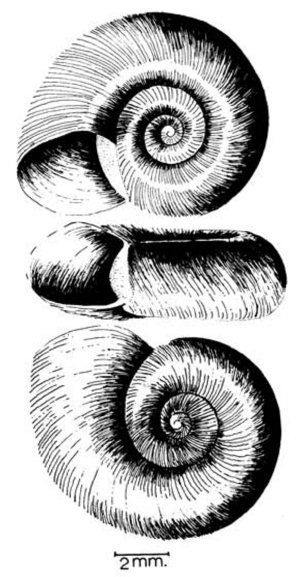Biomphalaria pfeifferi facts for kids
Quick facts for kids Biomphalaria pfeifferi |
|
|---|---|
 |
|
| Drawing of apical, apertural and umbilical view of the shell of Biomphalaria pfeifferi. | |
| Scientific classification |
|
| Kingdom: | Animalia |
| Phylum: | Mollusca |
| Class: | Gastropoda |
| Subclass: | Heterobranchia |
| Clade: | Euthyneura |
| Superorder: | Hygrophila |
| Family: | Planorbidae |
| Genus: | Biomphalaria |
| Species: |
B. pfeifferi
|
| Binomial name | |
| Biomphalaria pfeifferi (Krauss, 1848)
|
|
| Script error: The function "autoWithCaption" does not exist. | |
Script error: No such module "Check for conflicting parameters".
Biomphalaria pfeifferi is a type of air-breathing freshwater snail. It's a small mollusk that lives in water and belongs to the family of "ram's horn snails" because of its shell shape.
This snail is very important in medicine. It can carry a disease called schistosomiasis, which affects many people.
Contents
Where Biomphalaria pfeifferi Lives
Biomphalaria pfeifferi is originally from Africa. However, it has recently started to spread to new areas.
You can find Biomphalaria pfeifferi in these places:
- Western Africa: Like Senegal
- Eastern Africa: Such as Kenya
The first place where this snail was officially found and described was in the Umgani-Valley in Natal, South Africa. This was when Natal was a British colony.
How Biomphalaria pfeifferi Reproduces
B. pfeifferi is a hermaphrodite. This means each snail has both male and female reproductive parts. They can even reproduce by themselves, which is called self-fertilization. Even when they reproduce this way, their offspring usually stay strong and healthy.
How Biomphalaria pfeifferi Lives
Biomphalaria pfeifferi is quite tough. It can survive for up to 16 hours in water that has very little oxygen. It does this by using a special process to get energy.
In Kenya, these snails are often found living near the common blue water-lily, Nymphaea caerulea. They seem to like living together.
What Parasites Affect Biomphalaria pfeifferi
Biomphalaria pfeifferi can carry different types of parasites. Here are some of the 11 species of parasites found in these snails in Tanzania:
- Schistosoma mansoni (a very important parasite for human health)
- A type of clinostomatid
- Two types of strigea
- Cercaria porteri
- Cercaria blukwa
- Two types of echinostome
- Cercaria lileta
- Cercaria obscurior
- Cercaria bulla
Controlling Biomphalaria pfeifferi
People try different ways to control the number of Biomphalaria pfeifferi snails. This is important because they spread disease.
In Kenya, people have tried releasing the edible American crayfish, Procambarus clarkii. These crayfish eat the snails, which helps reduce their numbers. The crayfish also provide a new source of food and income for people. However, introducing new species can sometimes affect the local water plants.
Another way to control the snails is by using natural substances. The seeds from a tree called Balanites aegyptiaca can kill Biomphalaria pfeifferi snails.
Also, an extract from the fruits of the Dalbergia sissoo tree (from the Leguminosae family) has been shown to kill the eggs of Biomphalaria pfeifferi.
 | Kyle Baker |
 | Joseph Yoakum |
 | Laura Wheeler Waring |
 | Henry Ossawa Tanner |

